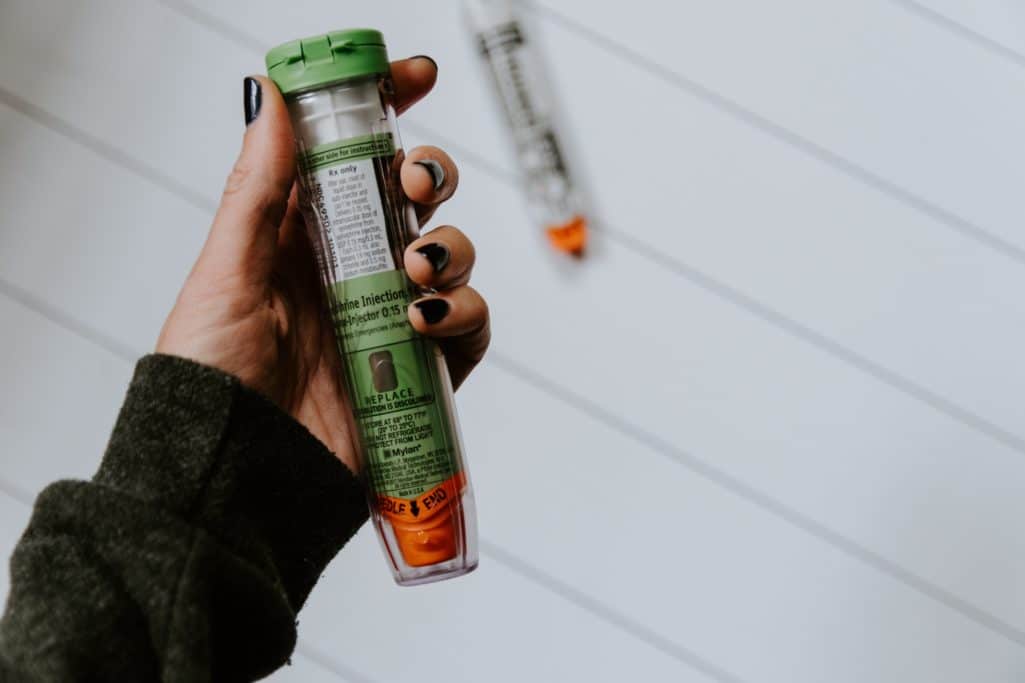Awareness
In this modern age where children are experiencing and encountering new objects than ever in the past, it is understandable that some of these interactions are bringing about a new set of problems. One such problem we are seeing more and more is the number of allergies experienced by adults and young people. Today, doctors are seeing a surge in child patients coming to them with allergies, especially ones caused by allergic reactions to food. Studies suggest that one in twenty children have an allergy of some kind and as many as 7% of all children having a reaction to an ingredient in food.

While most allergic reactions result in mildly uncomfortable symptoms, like runny eyes, mild swelling and sneezing, some cause far more serious reactions such as anaphylaxis. This can lead to hospitalization and in extreme circumstances life-altering problems and death. Simply put, anaphylaxis is a severe, possibly life-threatening, rapidly occurring allergic reaction where an individual’s immune system responds inappropriately to the presence of a substance that it wrongly perceives as a threat. While it is serious in most cases it is manageable with careful planning, medical advice, and accurate, comprehensive information and research.
Studies show
Deaths from allergies are extremely rare, about one hundred and fifty children die from food allergies alone in the United States every year, with nut allergies accounting for the vast majority. Other common allergies are known to cause serious reactions in children are fish, shellfish, peanuts, milk, and eggs.
The issues of allergic reactions
The problem with allergic reactions is that the symptoms cover a wide spectrum of seriousness and are unpredictable in nature. From the mildly annoying signs of hay fever to the full on anaphylaxis of a severe food allergy – the type of reactions in patients can vary wildly. For those with mild reactions, anti-histamine tablets, syrups, eye drops, and nasal sprays can be administered to relieve symptoms and may be all that is required to treat the problem. If, however, your child is unfortunate enough to have a history of more serious allergic reactions then your doctor may supply you with an epinephrine auto-injector or an EpiPen for short.

The effects of EpiPen
EpiPen’s deliver medicine quickly and effectively by injecting the drug epinephrine directly into the bloodstream of the patient. Sometimes epinephrine may be called by its brand name, EpiPen, EpiPen Jr or Twinject, but whichever brand you are prescribed, the drug always comes in an injectable form, usually in a type of auto-injector designed to allow a person with little or no medical training to easily inject a drug into a patient. The drug epinephrine is a form of the hormone adrenaline and counteracts the symptoms of anaphylaxis by opening the airways to reduce breathing difficulties, narrowing the blood vessels to combat low blood pressure, and easing the feelings of faintness.
Risk assessments
If your child has a severe allergy, then awareness of your surroundings is essential. Carry out a risk assessment of all places that you visit. For example, if you are visiting a petting zoo or farm, be aware that some allergic children react to animal fur or feathers. If visiting a restaurant, make sure you get clear guidance on the contents of all food your child is going to consume. This will give the assurances that the food is prepared safely and away from ingredients that could cause an allergic reaction.
Food
If you are buying pre-prepared food then always read the label thoroughly and if in doubt don’t give it to your child. Never take a risk by assuming a food is ok. If you are not sure then don’t buy it. Better to be safe than sorry. When preparing food yourself that includes ingredients that your child is allergic to, ensure that all surfaces are cleaned thoroughly afterward and wash your hands and any other parts of your body that have come into contact with the substance. Also, get your child into the habit of a no share policy with his or her friends form an early age. This way you can ensure that he or she only eats and drinks their food prepared by you.

Educate your children
As your child grows, educating them on how to administer the EpiPen becomes vital. If your child is especially young then teaching the steps accompanied by a rhyme guiding them through the process can be a useful way for them to remember how it is done and will make practice fun.
The biggest problem with using EpiPen’s is that the seriousness of anaphylaxis can render those stricken by the reaction incapable of administering the drug themselves. This is where you, a friend or a family member who is aware of your child’s condition may be forced to act. It is incredibly important if your child suffers from these kinds of severe allergic reactions to ensure that everyone around them is aware of not only what causes the allergic reaction but also what and where the treatment to relieve the symptoms if they do suffer an episode.
The importance
It’s crucial that you have some kind of mechanism to let strangers know of your child’s allergy too, whether that be your child wearing a medical bracelet or some other item that advertises their allergy. Relaying your action plan for dealing with the allergy to your child’s school as well as any other places he or she spends time at, and giving them a supply of extra EpiPen’s is also a must.
Plan of action
Times, when the EpiPen is required, can be stressful and may even be life-threatening to your child, so it is essential to have a plan of action so you can calmly react to the situation. It is also essential to spot the warning signs – hives, wheezing, coughing, puffy eyes, difficulty swallowing or talking, swollen skin – and be ready as soon as you see the indicators to give EpiPen shots immediately. Sometimes, however, symptoms may not be as visible and you may not have a clear indicator that something is wrong. Even at times like these, the general rule is the same. If you are in doubt, give the shot. Don’t wait.
Don’t wait
The longer you wait to administer an EpiPen, the harder it is to stop the allergic reaction, mild or severe, and allergic reactions can change from mild to fatal quickly. It’s always better to be safe than sorry and remember that no child has ever died or had serious problems from a standard dose of epinephrine. When the warning signs do present, keep calm, remember the training and try not to freeze. The quicker you act the sooner your child will recover and the better the chances that your child will not suffer any long-term issues.
The lack of supply
Unfortunately, at the moment parents face a different type of problem if their child suffers from a severe allergy, specifically that EpiPen’s are in short supply worldwide and have been for many years. The lack of a constant supply and repeated shortages across the globe has meant that keeping EpiPen’s in stock has become increasingly difficult for most parents.
The epidemic
The lack of availability of the medical device this year alone, compounded by the issues of preceding years, has led to a rush on the devices and further issues finding auto-injectors in many areas. That’s a big worry for affected parents as their children return to school for the start of the school year. The specific reason for the EpiPen shortages isn’t apparent, with nobody admitting to any precise issues but it’s safe to say that difficulty accessing vital ingredients, or the equipment needed to deliver the medication, or problems with manufacturing are probably the root cause.
Shortages
In America alone, ongoing shortages have meant pharmacies have been forced to prescribe and ask patients to hold on to nearly expired or recently expired EpiPen’s, or store less than they usually would, to maintain supply for those who need them. This situation is worrying and one that doesn’t seem like it is going to be addressed any time soon.
If your child does have an episode and you have to administer a shot from an EpiPen always follow your doctor’s advice. They are the expert and have years of experience dealing with children with allergies. In most cases, however, the following set of rules can be used as a general guide:
- Familiarize yourself on how to use the EpiPen by reading how to use the device when you first get it. Don’t wait for an emergency to happen. Read the steps and practice regularly by acting out scenarios absent of your child to prevent distress.
- All EpiPen devices can be injected through clothing so don’t waste time stripping back layers of clothing. Inject as quickly as you can directly to your child.
- Use this drug for all emergencies where you think your child is having or is about to have an allergic reaction. Even if the source of the reaction is not apparent. Remember many sources could cause anaphylaxis, including insect stings or bites, food, drug and latex allergies. Just because your child hasn’t reacted to something before don’t assume that they are not having one now. In other words, don’t hesitate to administer the EpiPen.
- Keep the EpiPen with you and your child at all times and if possible keep spares at your school, home, work and anywhere else you and your child visit regularly. Make sure that you have full access to the place they are kept and ensure that there is at least one other person trained in EpiPen’s administration at each location.
- The epinephrine shot can be effective only if the medicine is still in date and has not become tainted. Epi shots do not need to be refrigerated. They do need to be kept at room temperature and away from direct sunlight.
- Be wary of putting your hand on the tip of the EpiPen as this can cause the auto-injector to fire. The last thing you need in a moment of stress is a shot of adrenaline to make yourself even more jittery.
- Keep the safety release fastened to the EpiPen until you are ready to use it. If the pen fires prematurely it is useless. If it’s the only one you have then that could be a huge problem.
- Do not use the EpiPen if the solution is not clear, has particles floating in it or of the expiration date has passed. Check expiration dates and if you are running low then speak to your GP about getting more.
- Replace your EpiPen’s yearly. Epinephrine degrades after about a year. Using an expired injector wouldn’t likely be harmful, but the medication might not be sufficient.
- When taking the pen out of the case, hold the pen with the tip down, and clench it tightly in your fist, again avoiding touching the tip.
- Remove the safety cap by pulling straight up. Do not bend or twist.
- Push the tip firmly into the mid-outer thigh of your child until you hear a “click” and hold for 10 seconds so that the drug is fully administered.
- Make sure that the emergency services are called either by somebody else while you are administering the EpiPen or yourself as soon as you can but not at the expense of administering the EpiPen shot.
- After you have given the shot, there will be liquid remaining in the injector. This liquid does not mean that you should re-inject your child. It is normal for some liquid to remain.
- Do not throw away the spent EpiPen injector. Take it to the hospital with you so that the doctors can see what you have given your child.
- If there is no positive response within ten minutes then further doses can be administered as required.
It is normal to feel scared or anxious when you have a child with a severe allergy but remember, if you think your child has an allergy that requires medical attention then speak to your doctor as soon as possible. Follow the training and follow the guidance. Always be safe and always be sure.
find out more about the EpiPen https://www.epipen.com/hcp/about-epipen-and-generic/dosage-and-administration


